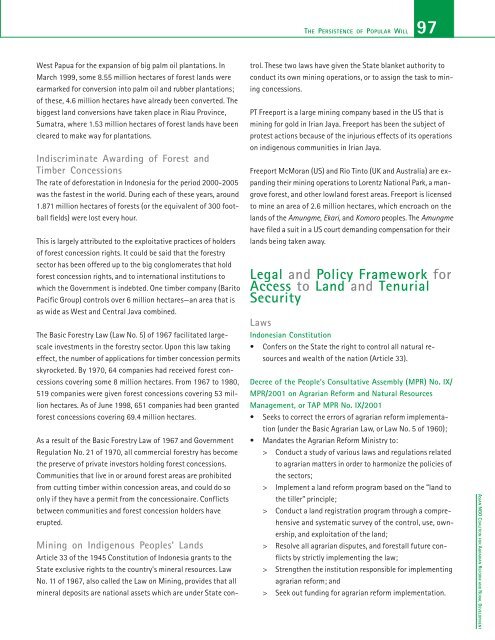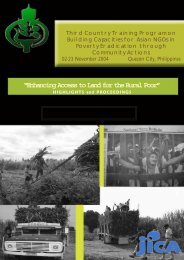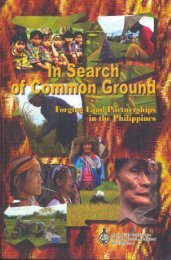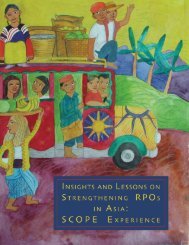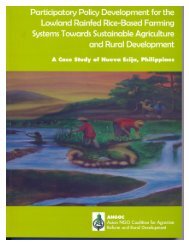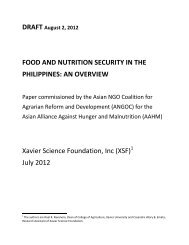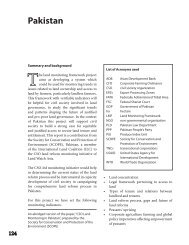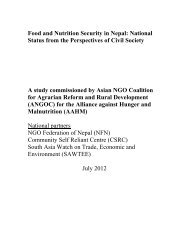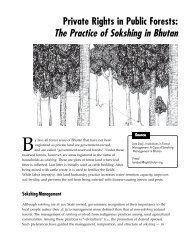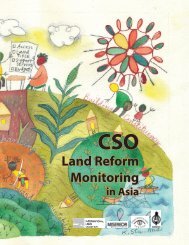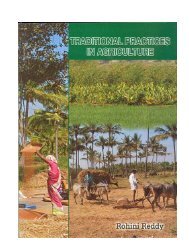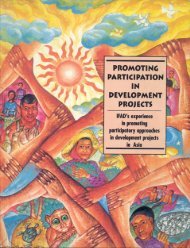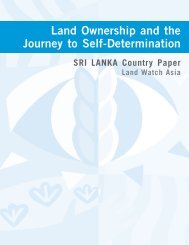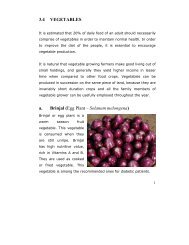Securing the Right to Land FULL - ANGOC
Securing the Right to Land FULL - ANGOC
Securing the Right to Land FULL - ANGOC
You also want an ePaper? Increase the reach of your titles
YUMPU automatically turns print PDFs into web optimized ePapers that Google loves.
West Papua for <strong>the</strong> expansion of big palm oil plantations. In<br />
March 1999, some 8.55 million hectares of forest lands were<br />
earmarked for conversion in<strong>to</strong> palm oil and rubber plantations;<br />
of <strong>the</strong>se, 4.6 million hectares have already been converted. The<br />
biggest land conversions have taken place in Riau Province,<br />
Sumatra, where 1.53 million hectares of forest lands have been<br />
cleared <strong>to</strong> make way for plantations.<br />
Indiscriminate Awarding of Forest and<br />
Timber Concessions<br />
The rate of deforestation in Indonesia for <strong>the</strong> period 2000-2005<br />
was <strong>the</strong> fastest in <strong>the</strong> world. During each of <strong>the</strong>se years, around<br />
1.871 million hectares of forests (or <strong>the</strong> equivalent of 300 football<br />
fields) were lost every hour.<br />
This is largely attributed <strong>to</strong> <strong>the</strong> exploitative practices of holders<br />
of forest concession rights. It could be said that <strong>the</strong> forestry<br />
sec<strong>to</strong>r has been offered up <strong>to</strong> <strong>the</strong> big conglomerates that hold<br />
forest concession rights, and <strong>to</strong> international institutions <strong>to</strong><br />
which <strong>the</strong> Government is indebted. One timber company (Bari<strong>to</strong><br />
Pacific Group) controls over 6 million hectares—an area that is<br />
as wide as West and Central Java combined.<br />
The Basic Forestry Law (Law No. 5) of 1967 facilitated largescale<br />
investments in <strong>the</strong> forestry sec<strong>to</strong>r. Upon this law taking<br />
effect, <strong>the</strong> number of applications for timber concession permits<br />
skyrocketed. By 1970, 64 companies had received forest concessions<br />
covering some 8 million hectares. From 1967 <strong>to</strong> 1980,<br />
519 companies were given forest concessions covering 53 million<br />
hectares. As of June 1998, 651 companies had been granted<br />
forest concessions covering 69.4 million hectares.<br />
As a result of <strong>the</strong> Basic Forestry Law of 1967 and Government<br />
Regulation No. 21 of 1970, all commercial forestry has become<br />
<strong>the</strong> preserve of private inves<strong>to</strong>rs holding forest concessions.<br />
Communities that live in or around forest areas are prohibited<br />
from cutting timber within concession areas, and could do so<br />
only if <strong>the</strong>y have a permit from <strong>the</strong> concessionaire. Conflicts<br />
between communities and forest concession holders have<br />
erupted.<br />
Mining on Indigenous Peoples’ <strong>Land</strong>s<br />
Article 33 of <strong>the</strong> 1945 Constitution of Indonesia grants <strong>to</strong> <strong>the</strong><br />
State exclusive rights <strong>to</strong> <strong>the</strong> country’s mineral resources. Law<br />
No. 11 of 1967, also called <strong>the</strong> Law on Mining, provides that all<br />
mineral deposits are national assets which are under State con-<br />
THE PERSISTENCE OF POPULAR WILL<br />
97<br />
trol. These two laws have given <strong>the</strong> State blanket authority <strong>to</strong><br />
conduct its own mining operations, or <strong>to</strong> assign <strong>the</strong> task <strong>to</strong> mining<br />
concessions.<br />
PT Freeport is a large mining company based in <strong>the</strong> US that is<br />
mining for gold in Irian Jaya. Freeport has been <strong>the</strong> subject of<br />
protest actions because of <strong>the</strong> injurious effects of its operations<br />
on indigenous communities in Irian Jaya.<br />
Freeport McMoran (US) and Rio Tin<strong>to</strong> (UK and Australia) are expanding<br />
<strong>the</strong>ir mining operations <strong>to</strong> Lorentz National Park, a mangrove<br />
forest, and o<strong>the</strong>r lowland forest areas. Freeport is licensed<br />
<strong>to</strong> mine an area of 2.6 million hectares, which encroach on <strong>the</strong><br />
lands of <strong>the</strong> Amungme, Ekari, and Komoro peoples. The Amungme<br />
have filed a suit in a US court demanding compensation for <strong>the</strong>ir<br />
lands being taken away.<br />
Legal and Policy Framework for<br />
Access <strong>to</strong> <strong>Land</strong> and Tenurial<br />
Security<br />
Laws<br />
Indonesian Constitution<br />
Confers on <strong>the</strong> State <strong>the</strong> right <strong>to</strong> control all natural resources<br />
and wealth of <strong>the</strong> nation (Article 33).<br />
Decree of <strong>the</strong> People’s Consultative Assembly (MPR) No. IX/<br />
MPR/2001 on Agrarian Reform and Natural Resources<br />
Management, or TAP MPR No. IX/2001<br />
Seeks <strong>to</strong> correct <strong>the</strong> errors of agrarian reform implementation<br />
(under <strong>the</strong> Basic Agrarian Law, or Law No. 5 of 1960);<br />
Mandates <strong>the</strong> Agrarian Reform Ministry <strong>to</strong>:<br />
> Conduct a study of various laws and regulations related<br />
<strong>to</strong> agrarian matters in order <strong>to</strong> harmonize <strong>the</strong> policies of<br />
<strong>the</strong> sec<strong>to</strong>rs;<br />
> Implement a land reform program based on <strong>the</strong> “land <strong>to</strong><br />
<strong>the</strong> tiller” principle;<br />
> Conduct a land registration program through a comprehensive<br />
and systematic survey of <strong>the</strong> control, use, ownership,<br />
and exploitation of <strong>the</strong> land;<br />
> Resolve all agrarian disputes, and forestall future conflicts<br />
by strictly implementing <strong>the</strong> law;<br />
> Streng<strong>the</strong>n <strong>the</strong> institution responsible for implementing<br />
agrarian reform; and<br />
> Seek out funding for agrarian reform implementation.<br />
ASIAN NGO COALITION FOR AGRARIAN REFORM AND RURAL DEVELOPMENT


